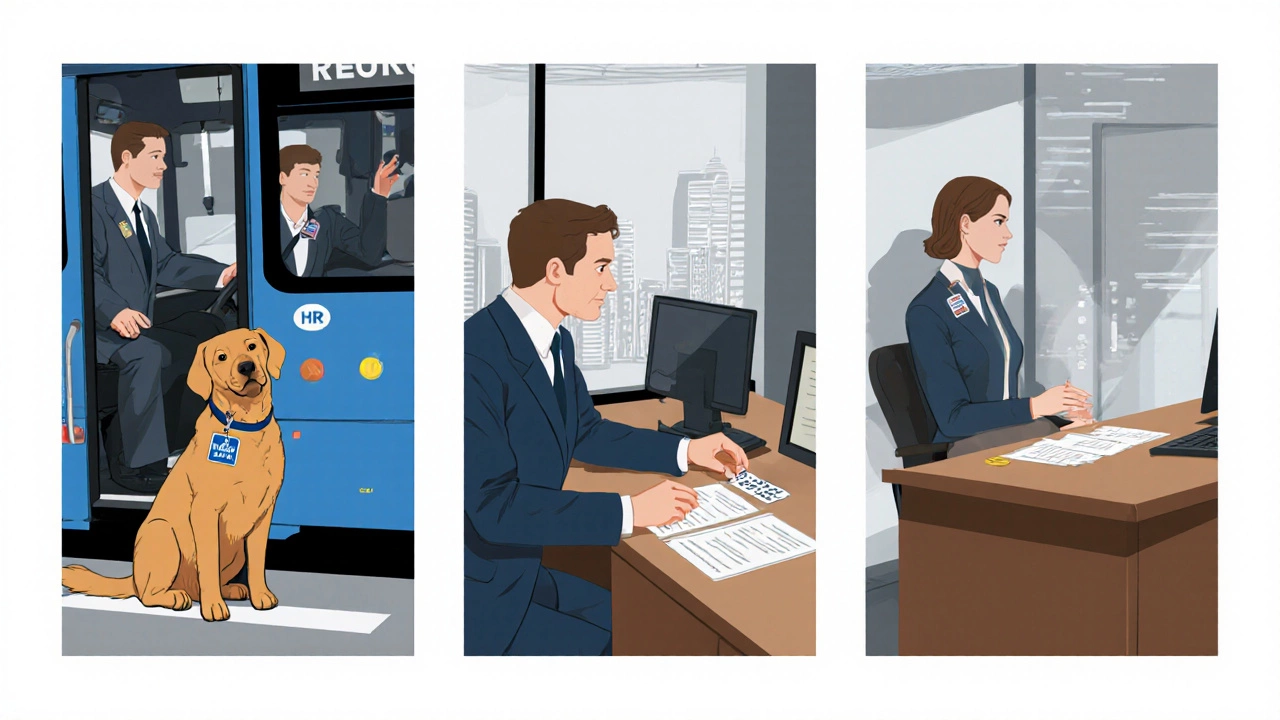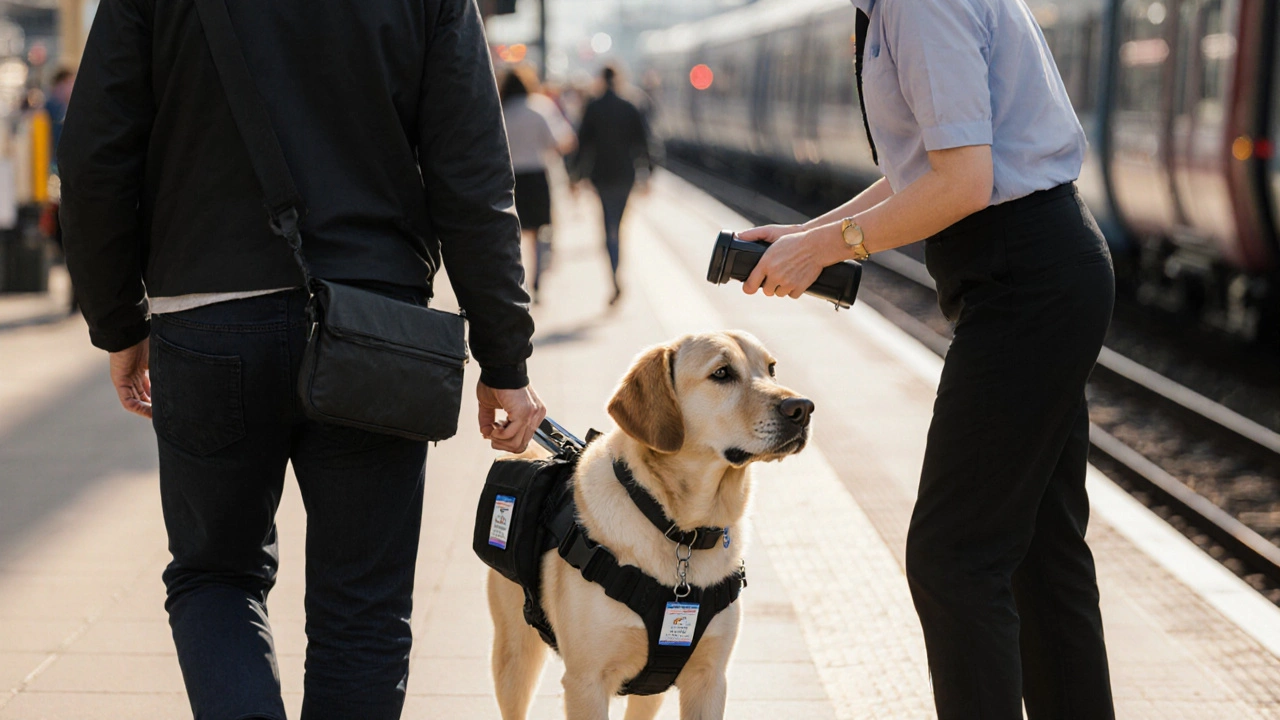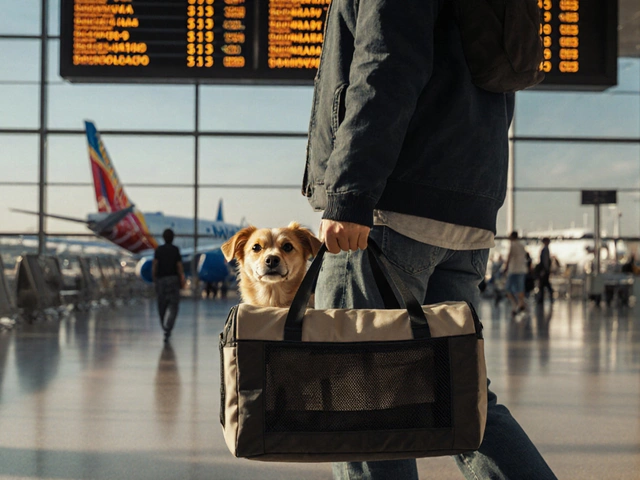Quick Summary
- In the UK, you are not legally required to carry any specific paperwork for a service dog.
- People can ask for reasonable confirmation of your dog’s status, but they cannot demand official certificates.
- Know the key laws - the Equality Act 2010 and the Assistance Dogs (UK)Charity Standards - that protect your rights.
- Carry a simple ID badge or a letter from a recognised assistance‑dog organisation for smooth interactions.
- If a request feels unreasonable, you can politely refuse and, if needed, seek advice from an equality advisory service.
When you walk with a service dog, it’s natural to wonder whether someone - a landlord, employer or transport officer - can demand to see "papers". The short answer is: no, they cannot force you to produce formal certification, but they can ask for reasonable proof of the dog’s role. Below we break down the legal backdrop, the kinds of evidence you may be asked for, and practical steps to handle any request confidently.
Service dog is a dog that has been trained to perform specific tasks for a person with a disability, as defined under the Equality Act 2010. Unlike emotional‑support animals, service dogs have clear, task‑related duties that mitigate a disabling condition.
1. The Legal Landscape in the UK
The Equality Act 2010 is the cornerstone of disability rights in Britain. It protects "disabled persons" from discrimination in public services, employment, housing and more. A service dog is considered an "auxiliary aid" that enables the person to exercise the same rights as anyone else.
Key points:
- Public places - shops, restaurants, transport - must allow a service dog unless there is a genuine health and safety reason (e.g., allergic customers where no reasonable alternative exists).
- Employers must make reasonable adjustments, which include allowing a service dog at work unless it creates a disproportionate burden.
- Landlords must treat a request for a service dog as a reasonable adjustment, similar to a request for a wheelchair ramp.
The Disability Discrimination Act (replaced by the Equality Act) historically set the premise that no specific documentation is mandatory. Today, the law focuses on the principle of "reasonable verification" rather than demanding certificates.
2. What Can Someone Legally Ask For?
While you are not forced to produce a formal certificate, a reasonable request can include:
- A simple ID badge issued by a recognised assistance‑dog charity.
- A letter confirming that the dog has been trained to assist with a specific disability.
- Evidence that the dog is under control (e.g., a harness, cue words).
What you cannot be forced to provide:
- Full training records or the names of trainers.
- Medical records linking your condition to the dog’s tasks.
- Any form of "passport" that is not universally recognised.
These limits protect your privacy while still giving organisations a way to confirm the dog’s role.
3. How to Respond to a Request
Stay calm and follow a three‑step script:
- Clarify the request. Ask politely, "Could you tell me what information you need to confirm the dog's status?"
- Provide reasonable proof. Show a badge or a brief letter. Keep it concise - a single page is enough.
- Know your right to refuse. If the request goes beyond reasonable verification (e.g., asking for a full training dossier), you can say, "I'm happy to show you my ID badge, but I'm not required to provide further documentation."
If the situation escalates, you can request to speak to a manager or note the incident for later reporting to an Equality Advisory Service.

4. Preparing a Minimal Proof Kit
Most service‑dog owners find it helpful to carry a small, professionally‑designed proof kit. Here’s what to include:
- ID badge. Issued by a recognised charity such as Assistance Dogs (UK) or Guide Dogs.
- One‑page letter. Drafted by your trainer or a medical professional, stating the dog’s tasks (e.g., "alerts to seizures").
- Contact card. A discreet card with a phone number for the charity that can verify the dog if needed.
Store everything in a waterproof pouch attached to the dog's harness. This preparation reduces stress and cuts down on awkward conversations.
5. When to Refuse and What Happens Next
If you encounter a request that clearly exceeds "reasonable verification," you have the legal ground to refuse. Here’s a quick decision tree:
- Is the request asking for a badge or short letter? - Provide it.
- Is the request demanding full training logs or medical records? - Politely decline.
- Does the staff member threaten to remove you from the premises? - Ask to speak to a manager and note the incident.
After an unjust refusal, you can:
- File a complaint with the organization’s equality team.
- Contact the Equality Advisory Service for free legal guidance.
- In severe cases, consider a formal discrimination claim through the Employment Tribunal or County Court.
6. Common Scenarios & Practical Tips
Below are typical places where you might face a request, plus a quick tip for each.
- Public transport (train, bus, tube). Carry your badge; most operators have a clear policy that they cannot demand paperwork.
- Airlines. While UK law applies on the ground, many airlines still ask for a letter. Request a "reasonable verification" clause in advance.
- Landlord/tenancy applications. Include a one‑page statement with your tenancy form; the landlord must treat it as a reasonable adjustment.
- Workplace. Offer your badge during the onboarding process; HR should already have a policy covering assistance animals.

7. Service Dog vs. Emotional‑Support Animal vs. Therapy Dog - A Quick Comparison
| Attribute | Service Dog | Emotional‑Support Animal (ESA) | Therapy Dog |
|---|---|---|---|
| Legal backing | Equality Act 2010 (auxiliary aid) | No statutory protection | Limited - only in specific programs |
| Tasks performed | Specific, disability‑related tasks | Provides comfort, no task requirement | Visiting hospitals, schools for morale |
| Documentation needed | Badge or short letter (reasonable verification) | None recognised by UK law | Program‑specific certification |
| Access rights | Public places, work, housing (reasonable adjustment) | None - may be treated as pet | Only when invited by host venue |
8. Mini‑FAQ
Frequently Asked Questions
Do I have to show a veterinary health certificate for my service dog?
No. A health certificate is required for the dog’s wellbeing, but it is not a legal proof of the dog’s assistance role. You can keep it handy for your own records, but you are not obliged to present it when asked.
Can a retailer refuse entry if I don’t have a badge?
They may ask for "reasonable verification". If you cannot produce a badge or short letter, you can politely state that the law does not require you to provide more than that. If they still refuse, you can request to speak to a manager and note the incident for a possible discrimination claim.
What if an airline asks for a full training record?
Airlines often have their own policies, but UK law still applies at the airport. You can offer a badge and a short verification letter. If they insist on full records, you may need to choose an airline that respects the Equality Act or file a complaint with the Civil Aviation Authority.
Is a handwritten note from my doctor enough?
A concise note that states your disability and the dog’s tasks can serve as reasonable verification. It doesn’t need to be a formal prescription; clarity is key.
Should I carry my service dog’s passport?
A pet passport is for travel with ordinary pets and does not replace proof of assistance status. Keep the passport for health checks, but rely on a badge or letter for legal verification.
9. Next Steps for Service Dog Owners
- Confirm your dog is registered with a recognised UK assistance‑dog charity.
- Order a professional ID badge and request a one‑page verification letter.
- Review the Equality Act 2010 sections on auxiliary aids - you can download a free guide from the Equality Advisory Service.
- Practice the three‑step response script so you feel confident in real‑world interactions.
- Keep a record of any incident where you felt pressured to provide extra documents; this helps if you need to lodge a complaint later.
Being prepared empowers you and your service dog to navigate public spaces without unnecessary hurdles. Remember, the law protects your right to be accompanied by your assistance animal, and a simple badge can go a long way toward smooth, respectful interactions.







